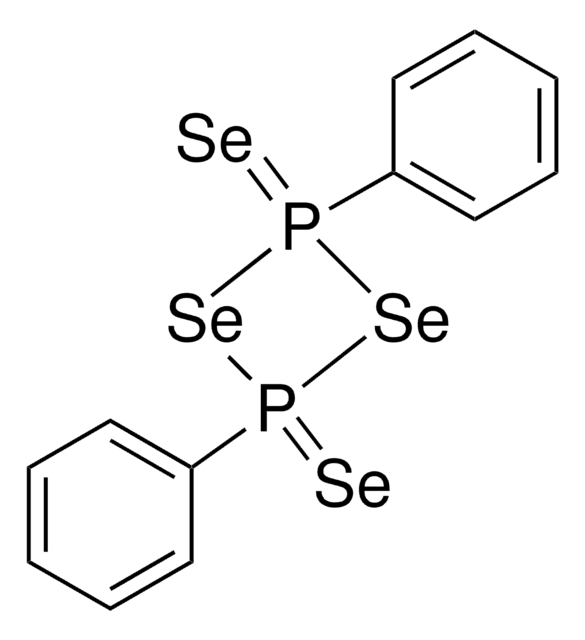227439
Lawesson reagent
97%
Synonyme(s) :
2,4-Bis(4-methoxyphenyl)-2,4-dithioxo-1,3,2,4-dithiadiphosphetane, 2,4-Bis-(4-methoxyphenyl)-1,3-dithia-2,4-diphosphetane 2,4-disulfide, 4-Methoxyphenylthiophosphoric cyclic di(thioanhydride), LR
About This Item
Produits recommandés
Niveau de qualité
Pureté
97%
Forme
powder
Pf
228-230 °C (lit.)
Chaîne SMILES
COc1ccc(cc1)P2(=S)SP(=S)(S2)c3ccc(OC)cc3
InChI
1S/C14H14O2P2S4/c1-15-11-3-7-13(8-4-11)17(19)21-18(20,22-17)14-9-5-12(16-2)6-10-14/h3-10H,1-2H3
Clé InChI
CFHGBZLNZZVTAY-UHFFFAOYSA-N
Vous recherchez des produits similaires ? Visite Guide de comparaison des produits
Catégories apparentées
Description générale
Application
- Oxthiaphosphinine-3-sulfide derivatives by the reaction with Mannich bases of β-naphthol and 8-hydroxyquinoline.
- 1,3,5,2-Trithiaphosphinane-2-sulfide derivatives by reacting with benzaldehyde in the presence of trialkyl phosphite.
- 2,4,6-Triphenyl-1,3,5-trithiane from benzaldehyde and ethyl acrylate.
- 9-Benzanthronethione by thionation of 9-benzanthone oxime.
- 1,2,4-Trithiolane from 2,2,4,4-tetramethyl-3-thioxocyclobutanone S-oxide.
- Sulfur derivatives of triterpenic oxo compounds.
- Tropothione in situ at room temperature and to trap it with dieneophiles.
Mention d'avertissement
Danger
Mentions de danger
Conseils de prudence
Classification des risques
Water-react 2
Risques supp
Code de la classe de stockage
4.3 - Hazardous materials which set free flammable gases upon contact with water
Classe de danger pour l'eau (WGK)
WGK 3
Point d'éclair (°F)
Not applicable
Point d'éclair (°C)
Not applicable
Certificats d'analyse (COA)
Recherchez un Certificats d'analyse (COA) en saisissant le numéro de lot du produit. Les numéros de lot figurent sur l'étiquette du produit après les mots "Lot" ou "Batch".
Déjà en possession de ce produit ?
Retrouvez la documentation relative aux produits que vous avez récemment achetés dans la Bibliothèque de documents.
Les clients ont également consulté
Notre équipe de scientifiques dispose d'une expérience dans tous les secteurs de la recherche, notamment en sciences de la vie, science des matériaux, synthèse chimique, chromatographie, analyse et dans de nombreux autres domaines..
Contacter notre Service technique











